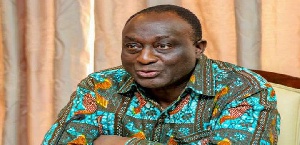 Trade and Industry Minister, Alan Kyeremanten is leading Ghana
Trade and Industry Minister, Alan Kyeremanten is leading Ghana
The first-ever Intra-African Trade Fair opened in Cairo on Tuesday seeking to achieve $25 billion dollars in trade deals over the next seven days.
Organised by the African Export- Import Bank (Afreximbank), the fair, which is being held from December 11 to 17, aims to bridge the low trade level among the countries on the African continent.
Currently, intra-African trade is low at about 15 per cent compared to Europe’s 59 per cent, Asia’s 51 per cent, and North America 37 per cent, because of lack of access to trade and market information.
It is to address the challenge that the Afreximbank in collaboration with the African Union decided to convene the Intra-African Trade Fair every two years to provide trade and market information and connect buyers and sellers from across the continent.
Mr Alan Kyeremanten, the Minister for Trade and Industry, who is leading Ghana’s delegation at the Fair, said the significance of the intra-Africa trade exhibition was that “even before the agreement comes into effect, Africa is working together to show the world and to also actually demonstrate to ourselves as African countries that we mean business when we talk about creating a single market”.
The African Continental Free Trade Area Agreement needs ratification from 22 countries to come into force. Already, 12 countries had underscored their confidence in the agreement by ratifying it.
Ghana Export Promotion Authority (GEPA) under the auspices of the Ministry of Trade and Industry is coordinating the participation of over 20 Ghanaian exhibitors at fair, who are showcasing various products, including cocoa products, handicrafts, and Ghanaian designed clothing.
The fair would provide Ghanaians a platform for entry into a single continental market for goods and services, free movement of business persons and investments joined together under the African Continental Free Trade Area.
“So I am excited that Ghana is fully here represented and apart from the private companies that are showcasing their products, we also have all the private sector support institutions and public sector agencies, which are helping with export and investments,” Mr Kyeremanten said.
He said significant progress had been made in the free trade agenda with close to 50 countries signing the deal.
“I still think that it is significant progress. These are decisions that are made at the national level and so it is our hope that every African country sign up to it. The important thing is that majority of the countries have signed up to it and the good thing is that you don’t need all the countries to sign before it becomes operational.
“The important thing is to send a strong signal once the agreement becomes effective and those who have not yet ratified it I am sure would join later,” he added.
Mr Sandy Osei Agyeman, Board Chairman GEPA, said he was looking forward to networking and meeting potential investors and participants from other countries to see how best Ghana can sell her products in each of these countries.
He said a continental Free Trade Area should open up the market wider as all trade barriers, which is the biggest challenge in trading on the continent, are removed.
“I think that with the continental free trade coming along this should help and I think it is the beginning of us getting to know ourselves as businesses so we can grow our economy,” Mr Agyeman added.
The key objectives of the IATF is to be a platform for sharing trade, investment and market information and enabling buyers and sellers, investors and countries to meet, discuss and conclude business deals worth of $ 25 billion over the course of seven days.
This, in turn, is expected to contribute to Afreximbank’s goal of increasing intra-African trade volume from $ 170 billion in 2014 to the US $ 250 billion by 2021, thereby ensuring that trade among African countries reaches 22% of Africa’s total trade by 2021.
The seven-day trade show is expected to attract over 1,000 exhibitors from across the continent and globally and 70,000 visitors from Africa and all over the world and representatives from the 55-member states of the African Union as well as access to a market of over 1 billion people.